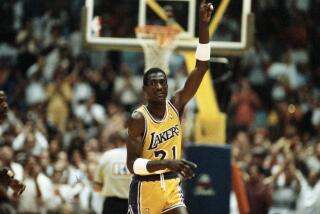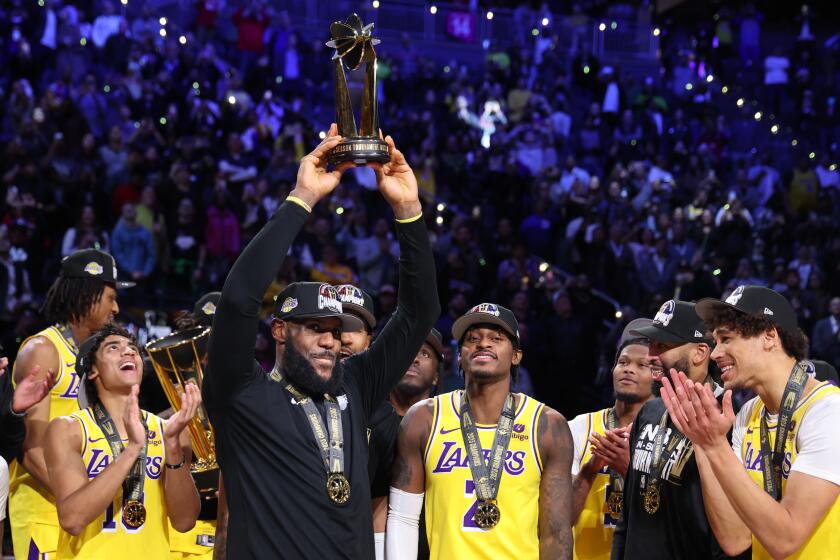Hank’s for the Memories
NEW ORLEANS — ” . . . in walked the trainer, on his face the queerest look.
He said, ‘The coach wants you, Amos, and bring your playbook.
I hopped off the taping table the quickest of ways
thinking this is a hell of a time to go over my plays.
But down to his office I ran, hamstring and all,
ready to show that I could play NFL ball.
The coach greeted me, ‘Son have a seat.’
His next words I still find it hard to repeat.
‘Son,’ he said affectionately, and this made my heart glow,
‘I’m afraid we’re going to have to let you go.’ ”
--From ‘The Turk,’ a poem by John Amos
*
John Amos came to praise the man who cut him from the Kansas City Chiefs.
Twice.
“The second time, I had written ‘The Turk,’ and I asked him if I could read it to the team before I left,” said Amos, once a running back at Colorado State, then cut by Denver and the Chiefs in a career that included being released by teams in far-flung places like Wheeling, West Va.; Norfolk, Va.; Waterbury, Conn.; Joliet, Ill.; and Victoria, Canada; now an actor on several TV series, including “West Wing” and “Good Times,” as well as the acclaimed “Roots” and an ongoing one-man play, “Halley’s Comet.”
The poem had been written while in a tub, hot water and Jack Daniels helping ease the pain of injury and a football career that wouldn’t get started.
Hank Stram said sure.
“They were blown away,” Amos said Saturday night. “ . . . That started to build the foundation for the confidence that I might be able to make it in the entertainment industry down the road.”
Amos, like everyone else who played for Stram, “wasn’t a football player,” The Mentor said, his voice as reedy and resonant at 77 as it was when he entertained reporters before losing to Green Bay, 35-10, in Super Bowl I; as when he was wired for sound on the sideline while beating Minnesota, 23-7, in Super Bowl IV.
“He was a young man who played football. You aren’t football. You play football.”
Mike Adamle had gotten that speech with the Chiefs.
So had Archie Manning with the Saints, and all who had gone before them on teams coached by Stram. Amos, Adamle and Manning joined others in a tribute, talking about their former boss, their friend for life and a man who keeps up with them by running up a phone bill that causes wife “Phyllis to give me hell,” Stram said.
They talked about the void in Canton, Ohio.
Among the winning coaches in the first 14 Super Bowls, Stram is the only one not in the Pro Football Hall of Fame.
“If you look at the man’s contributions to the game, as an innovator, as a pioneer, as a character, the players who played for him, his record . . . if you look at the entire picture, Hank Stram is like one of the founding fathers,” said Adamle, now a Chicago sportscaster, then a Chief. “There are people who have less credentials than Hank Stram who are in the Hall of Fame and he’s not. . . . It’s a crime.”
Added Amos, admittedly more a fan--”I have too much respect for those who played to say I have a career,” he says--”I don’t know what other credentials they could ask. He’s a winner. He’s an innovator. He developed a great many players who went on to the Hall of Fame. So I don’t know what other prerequisites are required.”
Stram was there for the tribute on a ruse, tricked into crossing the long bridge from his 22-acre plantation on other side of Lake Ponchartrain. Phyllis was getting an award from Catholic Charities for her work for Meals on Wheels, he was told, and when they walked into the room, he stopped and looked, confused while everyone laughed.
Then amused while everyone talked of Stram innovations--his two- and three-tight-end offenses; the moving pocket to allow Len Dawson to see to throw; the 3-4 defense. They told stories as he sat, dapper as ever in a dark suit, Super Bowl rings on each hand, blue eyes flashing only days after cataract surgery.
His hearing diminished, he occasionally turned to Phyllis for a repetition of speakers’ stories. When old football types get together, there are certain to be stories . . .
* About Stram being stopped while speeding with Manning to a golf tournament in Mississippi, and a Louisiana cop who was impressed with the coach and his Saints’ quarterback, but not with Stram’s Texas driver’s license that had expired 16 years earlier.
* About Adamle, being fined $250 by Stram for long hair and responding with a George Carlin routine that caused the coach to laugh, but not to rescind the fiscal hit.
* About John Beake, now a senior vice president with the Denver Broncos, once a high school coach in Nyack, N.Y., running the Kansas City offense because he was invited to the Chiefs’ camp by Stram.
* About Jim Garrett, with Stram in New Orleans as defensive coordinator on a day when Greg Landry and the Detroit Lions torched the defense.
About memories, things that happened so long ago with a coach who hasn’t been a coach in 22 years. And about what hasn’t happened, a wrong they say needs righting.
“I think it’s a travesty,” Beake said of Stram’s not being in the Pro Football Hall of Fame.
Said Manning: “He ought to be in it. . . . He won. He was a Hall of Fame coach. He’s got numerous players in there.”
Stram didn’t make it as an active candidate, hasn’t made the 15-person finalist list and is a longshot now that he is a senior candidate in a field that includes those whose careers ended 25 years ago. It stretches all the way back to the Hupmobile dealership in Canton, Ohio, and 1920.
The reasons he’s not in are several, according to a veteran Hall of Fame voter who said he had supported Stram for years, when he was getting votes, but never enough to make the first cut.
There is the American Football League and a diminishing number of voters old enough to remember it.
Stram was the only coach the Chiefs had in their first 14 seasons, first in their Dallas Texans’ incarnation, then in Kansas City. He is the only head coach whose career traversed the entirety of the 10 years of the AFL, and he was 124-76-10 with Dallas/Kansas City before being fired after the 1974 season.
“I don’t know if there’s [an anti-AFL] conspiracy theory,” Adamle said in the city that easily warms to such rumination.
And then there was New Orleans, where he was 7-21 before he was fired by the Saints’ then-owner John Mecom after the 1977 season.
“Maybe so,” said Manning of the Saints’ scar on Stram’s record. “But it shouldn’t if everybody knew the circumstances here. He had a five-year contract and started building a team. He didn’t shortcut it, didn’t mortgage the draft. He thought he had five years.”
He also thought he had Manning, who was injured and played in only eight of the 28 games Stram coached with the Saints. Manning was part of the foundation Stram built for his successor, Dick Nolan.
There is Lamar Hunt, the founding father of the AFL and of its merger with the NFL. Hunt spared no expense in getting players for Stram, and the coach could well be dealing with the same stigma Pat Riley and Phil Jackson have suffered in coaching the Lakers.
With players like Buck Buchanan, Willie Lanier, Bobby Bell, Len Dawson and Jan Stenerud--like Hunt, hall of famers all--Stram was supposed to win.
“The Super Bowl team that he had in 1969-70 would rival the 17-0 Dolphins, the ’86 Bears,” Adamle said. “I think talent-wise, it might have been the greatest team ever.
“But Hank developed that talent. . . . The stuff he did with organization was Paul Brown-esque.”
And there is Christmas, 1971.
“We lost our mystique that day and the Miami Dolphins began theirs,” Adamle said.
The Chiefs were playing Miami for the AFC’s first championship after the merger. The Dolphins’ Garo Yepremian kicked a 37-yard field goal, 7:40 into the second overtime period for a 27-24 win.
Kansas City’s Stenerud had missed from 32 yards out in the closing moments of regulation, and his 42-yarder was blocked by Nick Buoniconti in the first overtime.
“Jan Stenerud was the greatest kicker in football, and we never would have been in that game without him,” Stram said. “That’s how crazy the game is. . . . All we’ve got to do is kick a football in that game and we’re in three of the first five Super Bowls.”
It started Miami and Don Shula on their incredible run through the ‘70s and gave Hall of Fame voters who dismiss Stram’s accomplishments in the old AFL more ammunition.
He has gone from coaching to television to radio to unemployment, burning up telephone lines to connect with old friends, answering calls to talk with anybody with a talk show.
“The ironic thing is that there are people all over the country, people who have me on talk shows and things like that, and invariably they introduce me as Hank Stram, Hall of Fame, Kansas City Chiefs,” he said. “Everybody assumes I’m in the Hall of Fame.
“I am. I’m in the Polish Hall of Fame. In the Gary, Ind., Hall of Fame. In the Missouri Hall of Fame.”
But not the Pro Football Hall of Fame.
Between calls, he plays golf and goes to his church, practicing there with an organist for his Wednesday performance at Wrigley Field, where Cub fans will hear a Chicago son sing “Take Me Out to the Ball Game” during the seventh-inning stretch.
Stram won’t admit to being concerned about being on the outside looking in at Canton, where he has served as a presenter for former Chiefs.
“I’ve been rather fortunate,” he said. “I’ve got an attitude that you can’t worry about things you can’t control. If they think I belong in the Hall of Fame, that’s wonderful. If they don’t, well that’s the way it is. I don’t think about it.”
It’s fine rhetoric. It also isn’t completely true.
“It would be like three Super Bowls put together,” Phyllis Stram said. “He’s not going to sit and pout about it, but it’s in his mind constantly. It’s very important.
“I think anybody who has spent as many hours loving and working in a profession that he adores and achieving a lot of things, but seeing people decorated for things that he has also done and just hasn’t been recognized for, I think it’s hard. [The Hall of Fame] would mean a great deal for all of us.”
The “us” are friends who take up the cause. He wants it, that’s easy to see through a veneer that says, “It would certainly be an honor . . . but why worry about it? If it happens, it happens. If it doesn’t, it doesn’t.”
If it doesn’t, some people who gathered in a New Orleans hotel Saturday night will continue to take umbrage about what they see as injustice.
As history without a fitting conclusion.
(BEGIN TEXT OF INFOBOX / INFOGRAPHIC)
Not in the Club
How Hank Stram’s record compares with other top NFL coaches:
*--*
Coach Years Wins Titles HOF? Don Shula 33 347 2 Yes George Halas 40 324 6 Yes Tom Landry 29 370 2 Yes Curly Lambeau 33 229 6 Yes Chuck Noll 23 209 4 Yes Chuck Knox 22 193 0 No Dan Reeves 19 177 0 Not eligible Paul Brown 21 170 3 Yes Bud Grant 18 168 0 Yes Marv Levy 17 154 0 No Steve Owen 23 153 2 Yes Marty Schottenheimer 15 150 0 No Bill Parcells 15 149 2 Not eligible Joe Gibbs 12 140 3 Yes Hank Stram 17 136 2 No
*--*
Note: Coaches are eligible for the Hall of Fame the year after they retire, making Parcells eligible in 2001.
More to Read
Go beyond the scoreboard
Get the latest on L.A.'s teams in the daily Sports Report newsletter.
You may occasionally receive promotional content from the Los Angeles Times.










